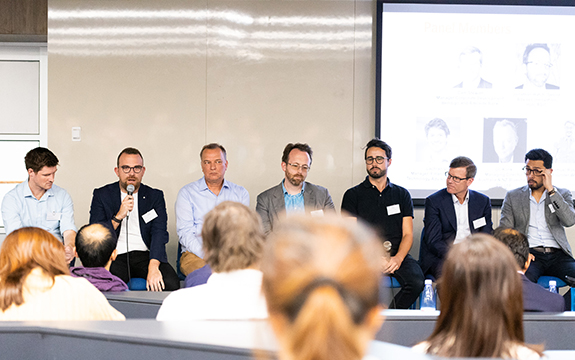Emerging technologies are changing the future of financial services

In Summary
- Swinburne hosted a panel discussion on the future of financial technologies
- Panellists discussed how new technologies are disrupting the financial services sector
- Swinburne’s Master of FinTech is the first-of-its-kind in Australia
Emerging technologies such as blockchain, data and artificial intelligence (AI) are disrupting the landscape of the financial services industry, participants at Swinburne’s Financial Technologies (FinTech) panel discussion have heard.
Renowned FinTech leaders came together to discuss the trends, challenges and opportunities of FinTech in Australia. The event’s panel discussion was moderated by Director of the Master of Financial Technologies, Dr Dimitrios Salampasis.
Representing a diverse range of industries from start-ups such as WORBLI and Moula, to traditional banks and regulatory bodies, the panellists shared insights into how FinTech is disrupting or presenting opportunities for their organisations.
Manager of Corporate Development at Bendigo and Adelaide Bank, Cameron Stewart, said that as customers move away from coming to physical branches, these expectations must be met with a strong digital strategy.
“We see the rise of FinTech as a real opportunity for us to partner with people developing smart ways of engaging with customers, improving their experience and creating efficiencies in business models,” Mr Stewart said.

From L to R: Lachlan Vogt, Matt Leeburn, Uli Klink, Jonathan Hatch, Samuel Russell, Cameron Stewart, Trey Zagante.
Many companies emerging as a result of these new technologies are changing the financial services sector.
Co-Founder and Executive Vice President Marketing and Product of WORBLI, Samuel Russell, said through blockchain technology, WORBLI aims to be at the forefront of a technological revolution that spans the financial services sector and beyond. The start-ups mission is to develop the world’s most cost-effective and developer-friendly consumer and enterprise blockchain platform.
“Our vision for WORBLI is one bank for every currency and also for all digital assets. There was no existing infrastructure for this, so we set out to build our own. There are nuances of blockchain that can really benefit how organisations operate today,” Mr Russell said.
“The biggest cultural challenge has been getting everyone working on the project to actually understand what it is. One of our focuses is executive education because there are so many intricacies of blockchain. Even at the grassroots, we’re still learning.”
A data-driven economy
Chief Commercial Officer of Moula, Matt Leeburn, said data is at the core of how his company operates and differentiates itself from traditional lenders. Moula was founded to help business owners in Australia access the funding they need to grow.
“We use data to assess loan applications and have seen a huge amount of growth in this space due to banks not lending as much. We use thousands of different data points to determine whether or not to lend to a business and how much,” he said.
Senior Adviser with the Australian Securities and Investments Commission’s Innovation Hub, Jonathan Hatch, said consumers are not always aware of how much data they share and what it is being used for.
“If you’re getting something for free that you used to pay for, you’re probably now paying for it in a different way, for example by selling your data,” he said.
Preparing for a future career in FinTech
According to Manager of Financial Services Technology Advisory at global management consulting and professional services firm Accenture, Lachlan Vogt, the FinTech professionals of the future will require a mix of skills so they can adapt to the ever-changing landscape of FinTech.
“You need the technical ability and skills to understand what you’re building, but it’s also important to have a good awareness of the business problem you’re trying to solve and what consumers will want,” he said.
Founder and Managing Partner of strategy and innovation consulting firm Venturetec, Trey Zagante’s advice to budding FinTech entrepreneurs was to remind them there’s a competitive advantage associated with being a FinTech start-up.
“One of the key benefits in a start-up environment is that you can get close to your customers and really understand them and their needs. You can identify opportunities to create value and get to market quicker with solutions. In large organisations, this process is slower because there are so many layers between customers and decision-makers,” he said.
Spearheading FinTech education at Swinburne
The panel discussion was part of the Frontiers of FinTech unit and gave students real-world insight into how technology is challenging traditional financial service organisations and creating opportunities to innovate in the sector.
Delivered through Swinburne’s Australian Graduate School of Entrepreneurship (AGSE), the Master of Financial Technologies is the first-of-its-kind in Australia.
The course provides graduates with an understanding of the major emerging technologies and how they affect products, services and business models across financial services industries.

